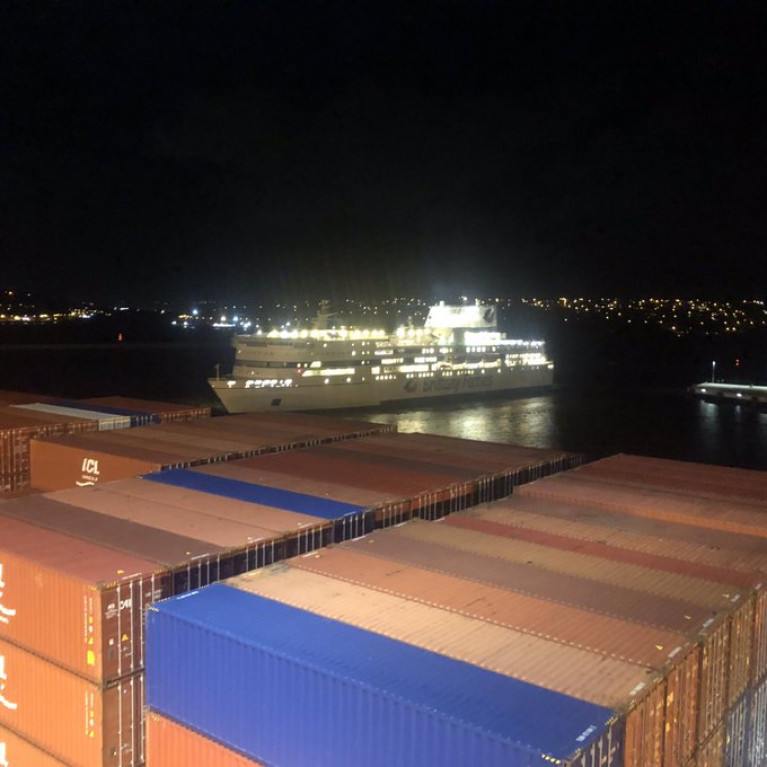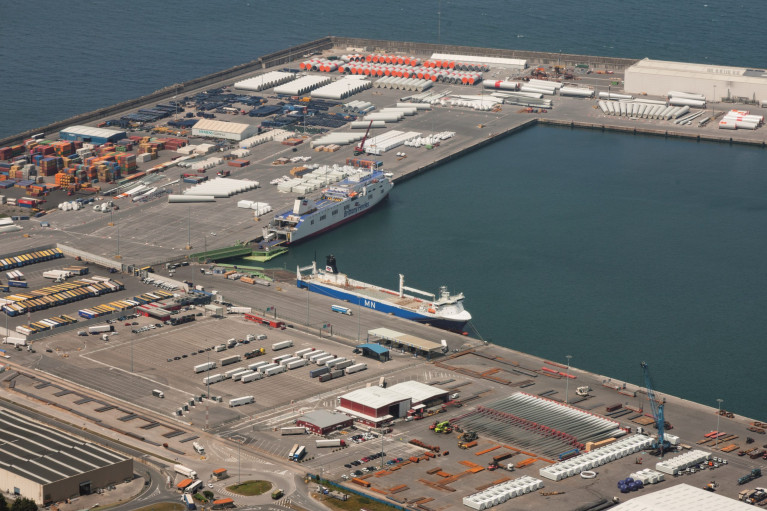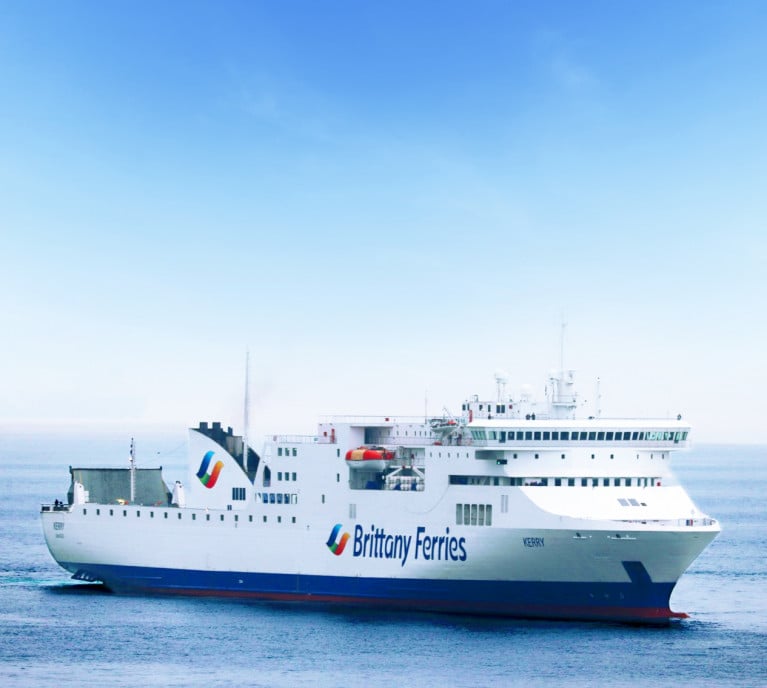Displaying items by tag: IrelandSpain
Brittany Ferries First LNG-Powered Passenger Ferry On Ireland Routes Makes Maiden Sailing to Spain
Brittany Ferries’ Salamanca is the first LNG (liquefied natural gas) powered passenger ferry to operate from Ireland as the E-Flexer class cruiseferry departed from Rosslare Europort this morning on its maiden voyage to Bilbao, Spain.
Following significant passenger growth on its Ireland-France (46%) and Ireland-Spain (9%) routes in 2022 compared with 2019, Brittany Ferries is now offering greater capacity and an enhanced experience for passengers with the introduction of the luxury cruise ferry, Salamanca.
The new energy-efficient, state-of-the-art ship replaces the predominantly freight-carrying vessel, Connemara. As well as significantly increased capacity* on the Rosslare-Bilbao route, Salamanca promises lower emissions and a smoother, quieter voyage for travellers.
Salamanca will sail from Rosslare to Bilbao twice weekly departing Wednesday and Friday mornings.
⦁ On LNG propulsion, lower emissions come from day one: air quality pollutants like sulphur and soot are virtually eliminated, plus there’s a 90% reduction on Nitrogen Oxide (NOx)
⦁ “Fuel agnostic” Salamanca will be ready to run on more renewable options like e-methane or bio-methane when they come on stream. LNG is the cleanest option available today.
General Manager of Brittany Ferries in Ireland, Hugh Bruton said, “Salamanca is the first of four Brittany Ferries vessels to be powered by cleaner liquefied natural gas (LNG). She will operate throughout the winter and into next summer on the Cherbourg and Bilbao to Rosslare routes. The aim is to grow by 50,000 the number of holidaymakers sailing between Ireland and Spain - as we have recognised that the demand is there. This modern cruise ferry is not only more sustainable but is better equipped and more spacious and luxurious than its predecessor. That means more space for passengers to relax on board, greater comfort and more to do and to share during the voyage.”
Christophe Mathieu, CEO of Brittany Ferries added, “Brittany Ferries is proud to be taking a lead by investing in the technologies of tomorrow. We have a responsibility to bring cleaner vessels to market, which is what we have done. LNG-powered ships such as the Salamanca are ‘cleaner today and greener tomorrow’, which helps to future-proof our decarbonisation journey - ensuring we can continue to play our part in a more sustainable future.
But bringing this new cruise ferry to the route is not just about sustainability. It’s about a commitment to Ireland and Spain and our desire to build a tourist route between two beautiful destinations. We have spent four years building freight connections; now is the time to focus on holiday-makers.”
Glenn Carr, Director, Commercial Business Units, Iarnród Éireann – Port Authority for Rosslare Europort - added, “There is no doubt that we are at a critical juncture when it comes to global energy security and supply. It is great to see companies such as Brittany Ferries investing in more sustainable vessels that run on cleaner fuels, mirroring our own decarbonisation journey in Iarnród Éireann and Rosslare Europort. LNG-powered, fuel-agnostic, hybrid and possibly even electric ships are a crucial part of the journey toward future-proofing the maritime industry. We look forward to welcoming all passengers, travelling on board the Salamanca through Rosslare Europort.”
As part of its overall fleet renewal plan, Brittany Ferries has invested in four LNG-powered vessels. The move includes two LNG-electric hybrid ships, arriving in 2024 and 2025 servicing UK and mainland European routes.
In addition to more efficient fuel, all of the Brittany Ferries’ LNG ships will be E-Flexer class vessels, featuring slender hulls and a design that offers a high level of hydrodynamic performance below the surface of the water. That means a smoother ride and less vibration even in difficult weather conditions.
LNG is currently the best fuel option available to shipping companies, delivering lower emissions and a 90% reduction on nitrogen oxide (Nox). Further future-proofing its sustainable journey, the Brittany Ferries Salamanca is described as ‘fuel agnostic’, which means that when even more renewable options like e-methane or bio-methane come on stream, it will be ready to run on them.
Salamanca will therefore automatically become greener in the coming years, following fuel technology, distribution and supply advances. Brittany Ferries is currently working with long-term fuel partner Repsol and the ports of Bilbao and Santander for refuelling its LNG ships.
Surge in Brittany Ferries' Bookings on Ireland-France Routes
Brittany Ferries, which operates the Ireland-France route of Cork-Roscoff, has reported a surge in bookings for summer 2022.
Since the onset of the pandemic, as Echo Live reports, the ferry company has navigated what it calls two "disastrous" summer seasons, where they lost €220m in 2020 alone.
However, an increase in reservations for next year has brought renewed optimism.
In a statement released today the company said that by the end of last month, 188,878 passengers had booked trips for July to September 2022 - a 48% increase from the 2020 summer season.
Reservations on routes between Ireland and France are currently up 234% and reservations on the Rosslare and Bilbao, Spain route are up 80%.
“The storm clouds are beginning to lift and I welcome the boost in reservations for next year,” said company CEO Christophe Mathieu.
“We are so grateful to our loyal customers. The support of the French government combined with the loyalty of our Irish and British customers will allow us to continue the beautiful voyage of this company.”
Brittany Ferries Ireland-Spain Route Sees Freight Rise 32% in A Year
Brittany Ferries is carrying more than 1,000 freight units a month on its Ireland-Spain route of Rosslare-Bilbao.
In total, 7,874 units were carried in the first eight months of this year, which was 70% or 3,246 units up on 2020 figures.
Since April, the route has consistently carried in excess of 1,000 trucks and trailers per month.
Ferry lanes linking Ireland with Spain were opened for the first time by Brittany Ferries in 2018. Since then the Rosslare-Bilbao route has become an important artery for hauliers and logistics operators. The number of companies using the service has grown by 70% since the first year.
Furthermore, latest data reveals changes in the way many haulage companies are moving goods across the continent. Mirroring wider trends across the industry, the number of unaccompanied loads on the route have increased by 46% in just a year.
Unaccompanied - or driverless - loads refer to trailers that are dropped off at the dockside by one company, driven aboard a ferry in port, then collected at their destination by another. Several companies have set up twinning operations with partners on the opposite side of the Bay of Biscay and Irish Sea. Irish hauliers can then pick up unaccompanied loads arriving from Spain, with Spanish hauliers picking up loads arriving from Ireland.
“Brittany Ferries has a long history of testing the marketplace with new routes, new ships and new ideas,” said Simon Wagstaff, freight director Brittany Ferries. “It wasn’t the quickest start for Ireland Spain, but we stuck with it because we could see the way the world was turning.”
“Firstly we knew we had to facilitate what became known as the Brexit by-pass, which meant presenting alternatives to the UK land-bridge for hauliers in Ireland and on the Iberian Peninsula. Secondly, the arrival of Covid coincided with a move towards unaccompanied loads. As a company, we were ideally set up to serve this growing trend in the industry.”
In Ireland, Brittany Ferries operates from two ports, Rosslare and Cork. Rosslare is also connected with Cherbourg in Normandy as well as Bilbao in Spain.
Services from Cork, which are more oriented to passenger traffic, connect with Roscoff.
The Rosslare-Bilbao service operates twice week in each direction, with sailings from Rosslare on Wednesdays and Fridays, and from Bilbao on Thursdays and Sunday.
Operator Brittany Ferries Maintains Commitment to Ireland-Spain Route But Relocates Port to Rosslare
In an announcement Brittany Ferries is to move its Ireland/Spain sailings from Cork to Rosslare Europort, with the first sailing due to take place on 28 February. The new Spanish arrival port from Rosslare will be Bilbao as Afloat also reported yesterday.
The French ferry company nevertheless emphasised its continuing commitment to its popular Cork-Roscoff route which celebrated its fortieth anniversary in 2018. Each year the Cork-Roscoff route carries nearly 100,000 holidaymakers between Ireland and France.
“This was not a decision we took lightly and follows extensive consultation with our freight customers who sought better road connections and reduced driving distances,” said Christophe Mathieu Brittany Ferries CEO. “We opened the route in 2018 with a two-year trial window. While passenger numbers have been encouraging, the reality is that freight numbers, which are key to route viability, were not sufficiently robust. However I want to make it clear that we remain committed to Cork, with our flagship Pont-Aven cruise-ferry service to Roscoff. We’re also committed to an Ireland-Spain route, now via Rosslare, and we’ll look after existing passengers whose future travel will be affected by this change.”
All customers already booked on affected sailings from the Port of Cork (see: response) will be given the option to transfer their booking to sailing between Rosslare and Bilbao/Roscoff. An allowance will be given to cover additional transfers. Alternatively, a full refund will be provided to those who choose to cancel.
The Cork-Santander route which was launched in 2018 was primarily aimed at the freight market into Europe although it also carried holidaymakers, with an ‘économie’ no-frills onboard experience. The new route out of Rosslare will again concentrate on freight with an option for holidaymakers.
Glenn Carr, General Manager, Rosslare Europort said: “We are delighted to welcome Brittany Ferries to Rosslare Europort. This new Rosslare to Bilbao service will be attractive for trade and tourism alike. We very much welcome that this service is being launched because of demand from freight customers, due to Rosslare’s strategic position and access to key markets. Brittany Ferries will also benefit from our €25 million investment in port facilities, infrastructure and technology, as part of the Port’s strategic plan. We look forward to working closely with Brittany Ferries to ensuring the success of their new service.”
Why Rosslare - Bilbao?
- Rosslare-Bilbao replaces Cork-Santander as key freight route to Europe
- The change is in response to demand from Irish and continental hauliers
- Company confirms ongoing commitment to Cork-Roscoff, which will continue to be primary tourism route
- New Rosslare services will include an Ireland-France rotation to Roscoff
- Rosslare sailings to commence 28 February 2020
The consensus among hauliers is that Rosslare, with its proximity to Dublin and the east coast road network, is a preferred option. Equally hauliers operating on the European mainland noted that Bilbao is more attuned to freight traffic and has easier transport links into Europe. Detailed discussions also took place with the Ports of Cork and Rosslare. The company has confirmed that Cork-Roscoff will remain a vital route for tourism, both into and out of Ireland.
As with the current Cork-Santander sailings, the new Rosslare-Bilbao sailing will be twice-weekly and will incorporate a weekly Ireland/France rotation. It is expected that despite the concentration on freight, the route will carry a number of holidaymakers to both Spain and France. This has been the experience with the existing Cork-Santander route.


























































